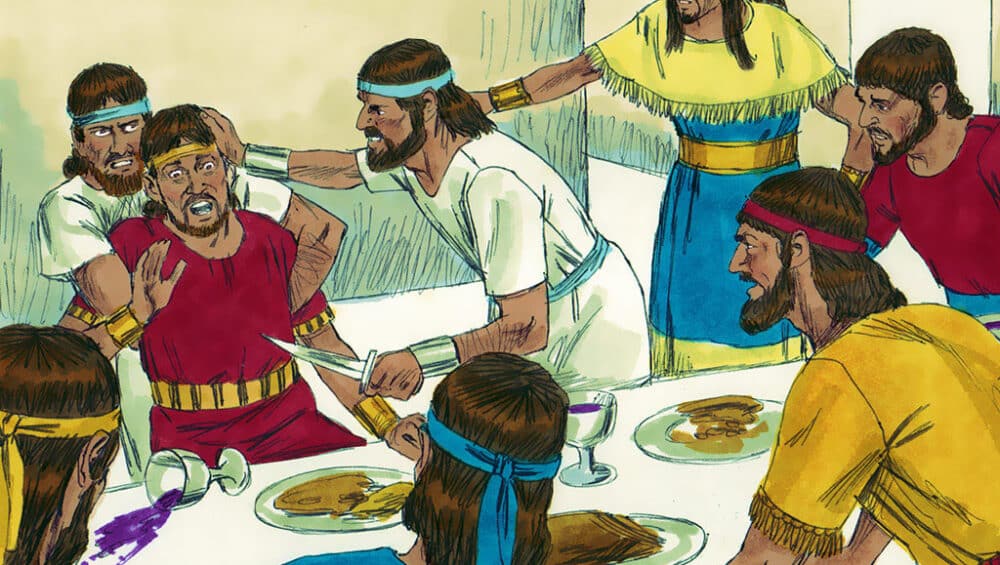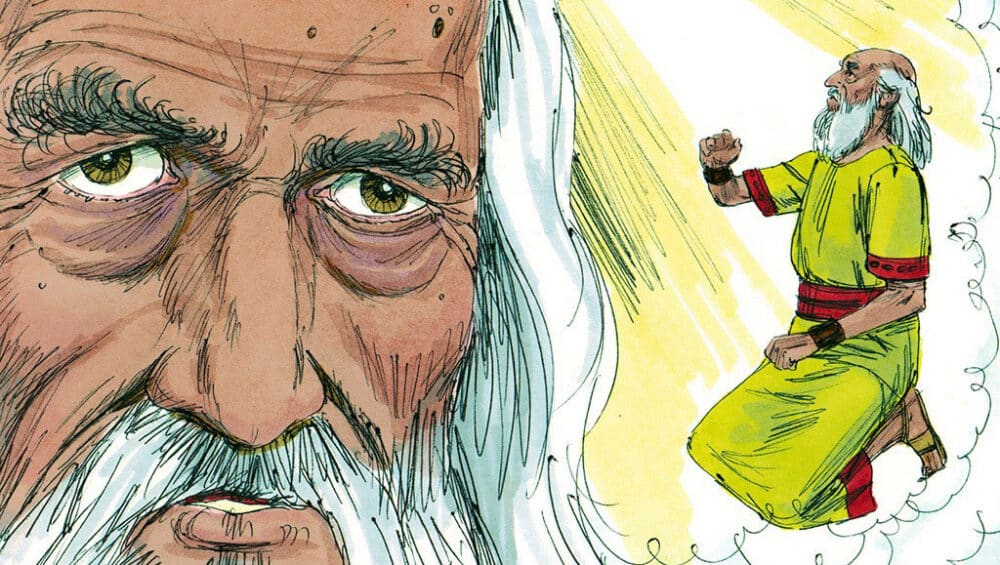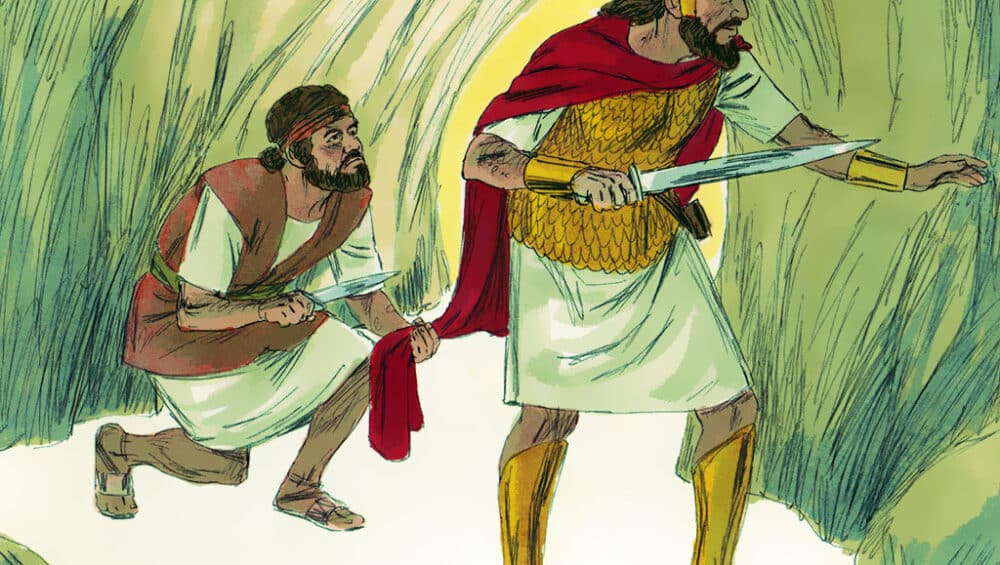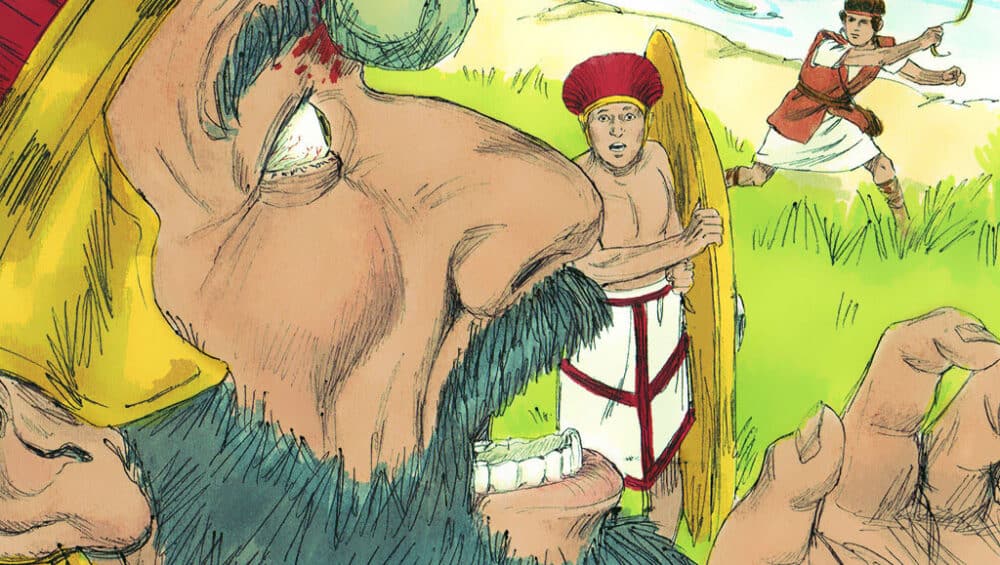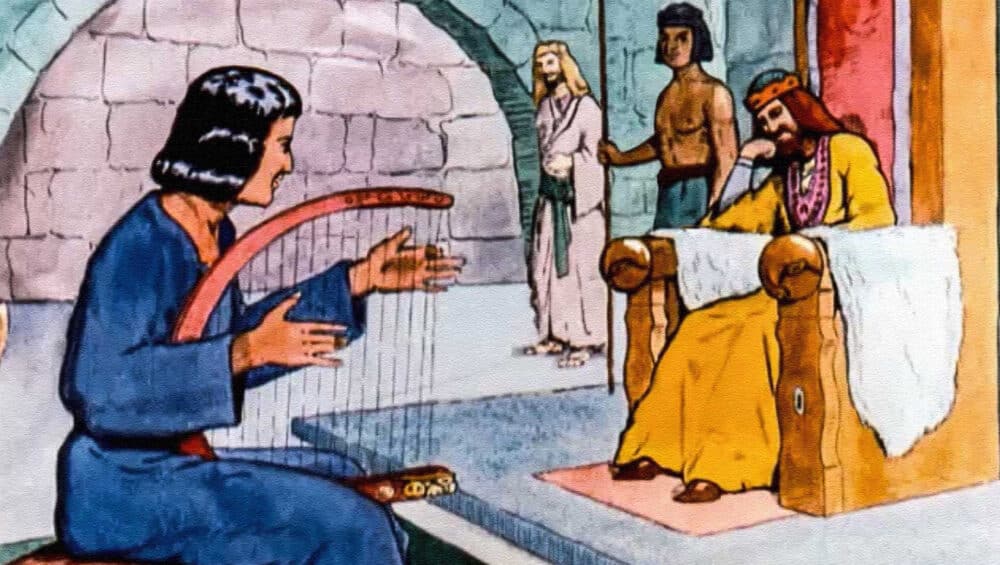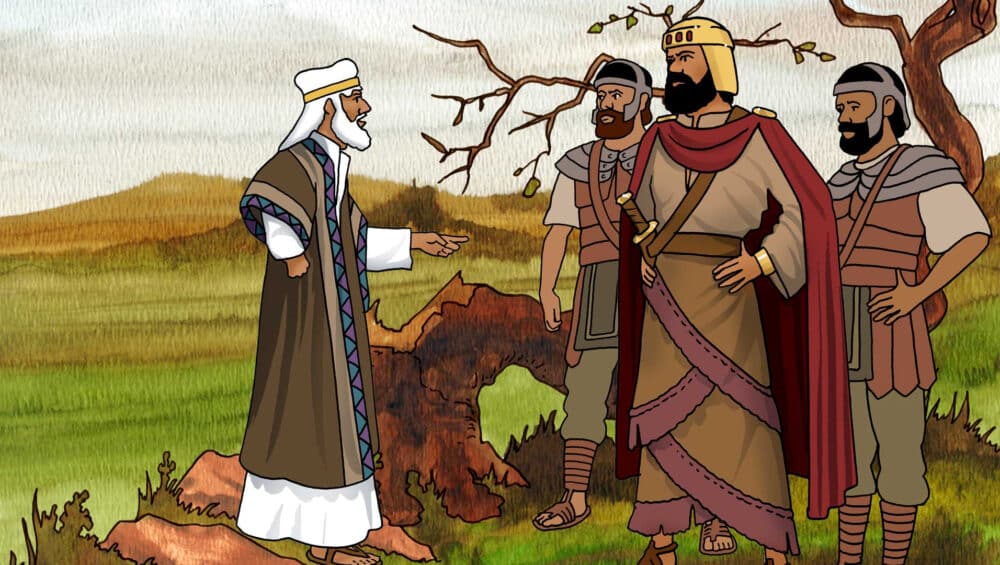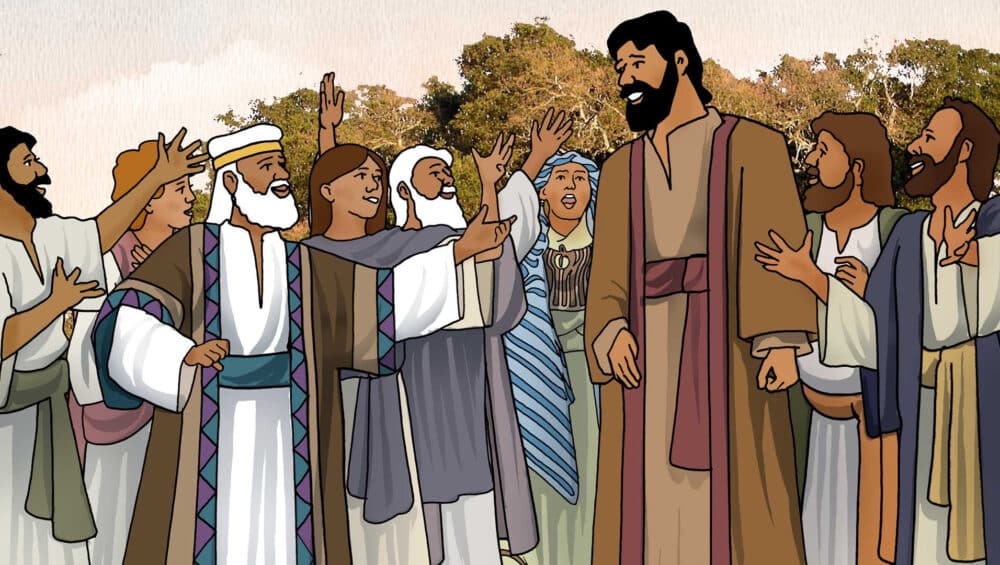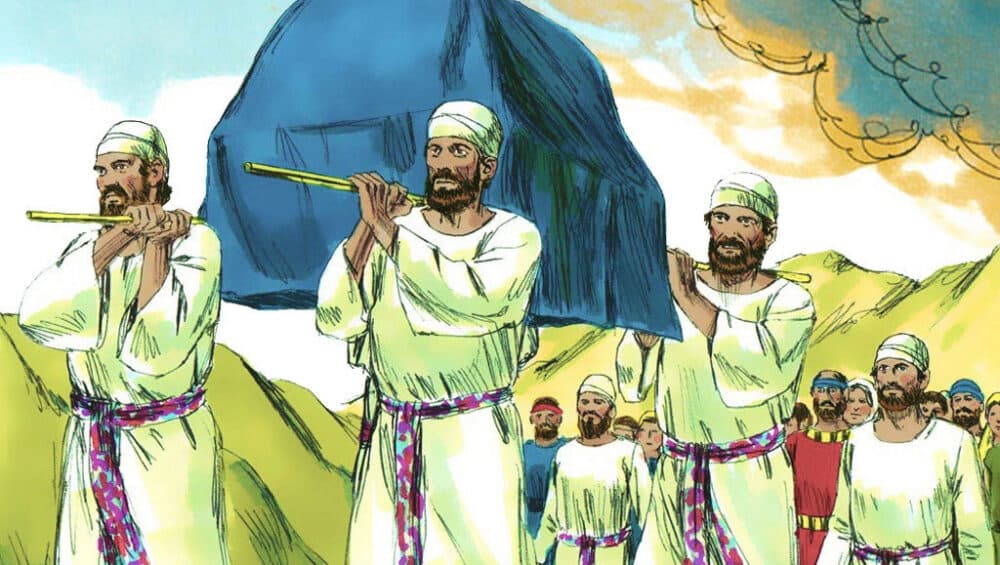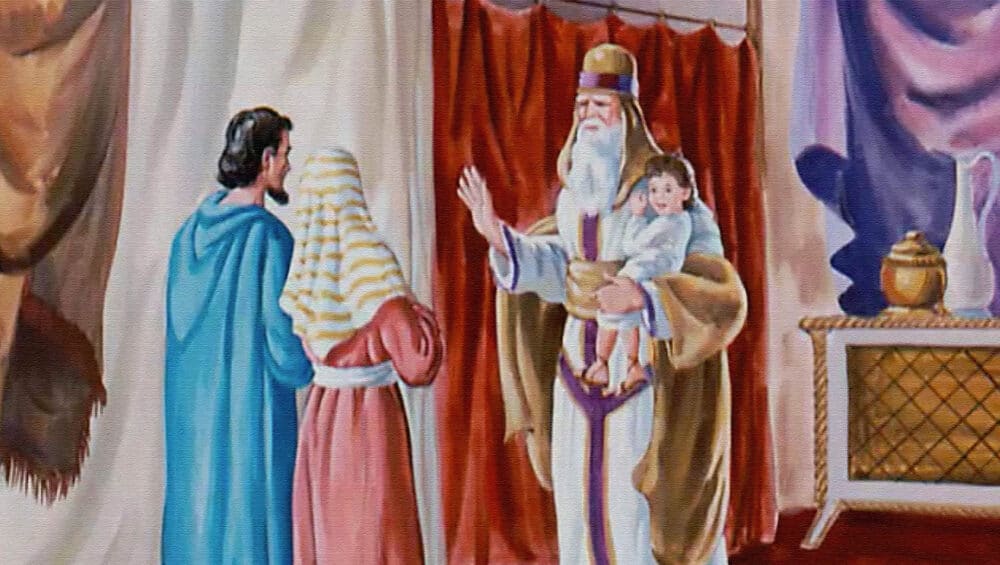Welcome to Livin’ Light’s Bible-In-A-Year challenge of discovering God’s love for us and His purpose for our lives. Here is the format for this great adventure: The daily reading assignment is posted at 5 a.m. After each day’s reading, Leigh An Coplin, the blog host, shares observations and poses questions about difficult passages to Rob Fields, who studied Christian Education at Asbury Seminary and currently teaches Biology in the Orlando area. To start from the beginning, click on 365 Bible Readings and scroll down to Day 1. The reading schedule is taken from The One Year Chronological Bible NLT.
Today’s Reading
— 1 Samuel 23:13-29
— Psalm 54
— 1 Samuel 24-25
(1011 BC) Click here for a timeline of the entire Bible.
Questions & Observations
Q. (1 Samuel 23:16): We can obviously see that Jonathan and David had a super-close relationship and that it’s base was a love of God. It’s so nice to have close friends encourage one another to stay strong in their faith. If there is faith, there is love and that love is binding. Since I have become a stronger Christian, it is definitely easier to talk about God, especially with those who know me. But, I have to admit, that if someone I don’t know at all or a little talks to me about my faith or encourages me, I can be offended. I feel like they are saying that my faith isn’t strong, when they don’t even know me. But now, maybe that I’m wearing my faith more, they will notice and I won’t get those questions. So, here’s the question. We all want to proclaim God and tell others, but when is it the right time? Do we wait for the Spirit? There are many times when I want to bring up my love for God/Jesus/Spirit, but I feel that if I do, I would turn that person away from me and thus, lose the opportunity to eventually bring up God. So, do we wait for the Spirit to show us the right time, or open our mouths as soon as our brain says we want to share or proclaim?
A. 1 Peter 3:15 talks about being “ready” to give an answer for the hope that we have in Christ. That, I think, is a good summary of what is expected of us. When asked, we must be willing to boldly defend the faith that we have. But to me, that is as far as the ABSOLUTE requirement goes. Stay with me: I’m not saying that we are not commanded to share the Gospel — we are! — but rather what I’m saying is that beyond our requirement to answer those who would question our faith, we are NOT required to share the Gospel 24/7. We can discern, with the Spirit’s help, when is a good time to share, and when to keep silent. Ideally for me, I like for the other person to broach the subject — and yes, I realize that life is not always ideal — and bring up the conversation. That, in my mind, goes a long way toward preventing us being a burden on others, especially if they do not react well to our message. No one wants to be that person who drives people further away from the Gospel (even the ones who actually DO drive people away think they are bringing people to Christ). I wouldn’t make sharing your faith the first part of every conversation with a stranger — you’ll surely turn some people off that way — but I would also say that if you are presented a good opportunity, it is your responsibly to God to be His ambassador (2 Corinthians 5:20). Being in relationship with non-Christians will go a long way toward affording you opportunities to share your message, and believe me, if you take the Gospel seriously, you will get some funny looks and be asked by others. Besides all of this, Jesus tells us in the Sermon on the Mount that our good deeds are to be done for the glory of God, that others will see this and realize the truth about God as well (Matthew 5:16).
So to sum up: get to know people before you share, if you can; wait for them to ask you; be discerning about when is a good time to share; be sure you are doing good works (and you are crediting God for inspiring them), and be willing to answer challenges that are put to you. I hope that’s helpful.
Q. (24:3): I take it that “relieve himself” means sleep and not needing to urinate? As I recall, Saul falls asleep, and that’s how David cuts his robe.
A. Nope. The Hebrew translates as “cover his feet” (which is actually what the say in the King James), but it’s a euphemism for using the bathroom (the same phrase is used in Judges 3:24 if you’re interested, and I know you are…). I’m going to just stop there.
Q. (24:16-21): Saul does a nice 180° turn of attitude. Any comments, Rob?
A. Sure. Saul is given a moment of humanity here, and he becomes aware of how faithful David has been to him, even in the midst of Saul’s attempts to kill him. It is obviously a very emotional scene. Pay close attention to that request in verse 21, it will be very important to the subsequent story of David’s rule, and it leads to one of my favorite stories in all of Scripture.
Q. (25:1b-22): Isn’t David using God here? I didn’t read that God commanded him to approach Nabal. Obviously, David and his men are very hungry.
A. I wouldn’t say David is using God; he is trying to gain provisions for his men, but reacts quite poorly to Nabal’s rebuke. I actually think that lack of reference to God in this story is quite telling. Unlike the last chapter, he certainly did not consult with God before moving to slaughter Nabal and his family. Good thing Abigail smooths things over.
O. (25:23-38): This is a WOW story for me. There are so many interesting things here.
No. 1 is how God tactfully uses women in a man’s world to do His work. We see here the differences in men’s and women’s temperament. When David is rejected, his response is vengeance. The wife, Abigail, knows that men can be foolish, especially her husband, and make rash decisions without thinking of the consequences (I’m not knocking men, more underscoring women’s intuition). She thinks of an alternate, peaceful plan to this hostility. In my experience, a woman’s instinct, sixth sense, empathy — whatever you want to call it — is super strong. But, in the same frame, women can overthink and never act. Thus, comes a man. They make a great pair … if they work together.
No. 2: What a difference one person can make. Here, Abigail made a huge save. But also, the servant who told Abigail of the fiasco was a hero. If he didn’t have the courage to counter the king, he and all of his friends would be dead.
No. 3. I love how Nabal’s name means “fool.” Who would name their kid that?
No. 4. Abigail says that David’s “enemies will disappear like stones shot from a sling!” And, ta-da, Nabal was paralyzed like a stone and died.
This is my favorite story thus far.
Q. (25:39-44): Yeah! We have a love story. What a great ending. But, then, David has left behind his first wife, Saul’s daughter Michal, and lost her to someone else. I guess this is just something that goes with the territory of being on the run. And, I would guess that it would be awkward to be married to a daughter of someone who wanted to kill you, even if they vowed not to be a threat any longer. But, why does David marry again? God has established that a marriage should be between one man and one woman. And, David is the anointed one. I do believe that we will learn that David has a weakness for women. This was the flaw that ruined Samson. As a woman, I don’t understand this strong desire and wild instinct men have toward women. I do understand that for those who strive to be righteous, that lusting after women is a huge struggle. Do you believe that this is a way God tests the strength of a man’s will?
A. David certainly does have a way with the ladies, doesn’t he? Just kidding. Okay, so here’s the deal, even though God created man and woman to be in relationship together — one at a time in other words — the reality of this society at this time did not live up to God’s standard, and this includes David. Marriage, at this point, was not selected out of love, but rather political expediency: Saul gave Michal to David in marriage to unite the families and gain David’s political alliance. Society, especially royalty, continued to operate in this way until the middle of the last century. Women were, and frankly, used by men to create political alliances, strengthen old ones, etc. So we must be very careful about applying 21st Century cultural norms — whatever those are these days — to an ancient passage. David saw a valuable resource in Abigail, so while he may have been attracted to her, at least part of the reason he married her was to benefit himself. Abigail didn’t exactly lose out on the bargain either — she was very unlikely to have good protection without her foolish husband, so she definitely moved up in the world as well.
David will take several other wives — we will even see Michal again — so don’t let that be a surprise to you. I’m not going to excuse their actions, especially since God is clear that this “big love” idea is not His desire. Regardless of God’s ideal, and even the warnings He issues about having multiple wives (Deuteronomy 17:17 SPECIFICALLY says for kings not to!), David and Solomon will not listen to this order. And please note that the law is there for a reason: we will see how polygamy will be extremely costly in both the lives and rules of David and Solomon, David’s son and successor. This sin — that is what it is — will truly haunt both of these men. In David’s case, the children of these wives, and the wives themselves, will become petty and jealous of each other. It will lead to terrible consequences: rape and incest, murder, and the rebellion of one of David’s sons. It sounds like a soap opera to me, something to watch for in 2 Samuel. In Solomon’s case, his many (many many many…) wives will undercut his walk with God, and bring about not only his downfall, but the downfall of the united nation. So don’t make the mistake of thinking that God is just going to “allow” these men to do whatever they want when it comes to wives. There will be a severe penalty for each of them. Polygamy is not God’s ideal for a reason. It has dire consequences for both genders, and ultimately leads people away from God, not closer to Him.
Tomorrow, the David and Saul story continues.
For further interest: The roots of coronating kings are in this Old Testament account of Samuel, Saul and David. https://www.ox.ac.uk/news-and-events/oxford-people/George-Garnett
Shop: Christian shirts get noticed. Check out these conversation starters: https://livinlight.org/shop/
Tomorrow’s reading
— 1 Samuel 26-27:7
— 1 Chronicles 12:1-7
— 1 Samuel 27:8-29:11
— 1 Chronicles 12:19
— Psalm 56

